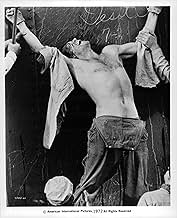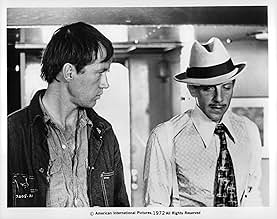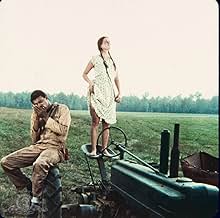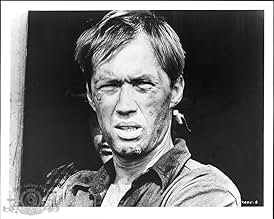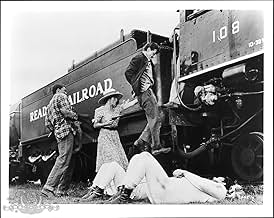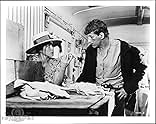VALUTAZIONE IMDb
6,0/10
11.854
LA TUA VALUTAZIONE
Durante la Grande Depressione, un sindacalista e una giovane donna diventano criminali per vendicarsi della gestione di una ferrovia.Durante la Grande Depressione, un sindacalista e una giovane donna diventano criminali per vendicarsi della gestione di una ferrovia.Durante la Grande Depressione, un sindacalista e una giovane donna diventano criminali per vendicarsi della gestione di una ferrovia.
- Regia
- Sceneggiatura
- Star
- Premi
- 1 candidatura in totale
David Osterhout
- McIver #2
- (as David R. Osterhout)
Grahame Pratt
- Emeric Pressburger
- (solo nei titoli)
'Chicken' Holleman
- M. Powell
- (solo nei titoli)
Harry Northup
- Harvey Hall
- (as Harry Northrup)
Jerry Cortez
- Sheriff
- (non citato nei titoli originali)
Louie Elias
- Boxcar Tough
- (non citato nei titoli originali)
Michael Fitzgerald
- Apple Peeler
- (non citato nei titoli originali)
Gura Lashlee
- Hobo
- (non citato nei titoli originali)
Gerald Raines
- Train Engineer
- (non citato nei titoli originali)
Recensioni in evidenza
Boxcar Bertha is an early Scorcese, made just on the eve of his highly personal breakthrough film Mean Streets. In other words, these were the days before he could call the shots and was merely a jobbing director. It's a cheap exploitation flick, and like most B-pictures it's a cash-in knock-off of a recent hit movie in this case Bonnie and Clyde. It crams in all the essential ingredients for the genre hold-ups, union men, pinkertons, chain gangs and, of course, boxcars along with a dash of nudity and gory violence to help it sell.
The story follows the same arc as its peers likable proles take to a life of crime to escape the depression, have a number of run-ins and adventures, until they eventually meet their downfall. The screenplay is fairly lazy and predictable, although the writers have tried to inject some depth and conflict to the characters. Bill, for example, struggles to reconcile his socialist values with his individualist criminal antics. Rake is ashamed of his cushy city roots and wants desperately to prove himself. Bertha herself is portrayed as a kind of happy-go-lucky individual with no real agenda apart from living the life she enjoys and being with the man she loves. Sadly these ideas are never fully explored, and tend to get lost behind the simplistic b-action setting.
Boxcar Bertha also happens to be surprisingly loaded with religious references, painting Bill as a Jesus-like figure. Most obvious of these is the highly symbolic ending, but there are a number of more subtle hints. A scene somewhere in the middle opens with David Carradine standing before a biblical fresco, and later in the city Barbara Hershey stops to look at a film poster for The Man who Could Work Miracles. The religious angle is something which actually runs through all of Scorcese's work, rarely stated out loud but always under the surface.
Scorcese's technical style is fairly functional and not too flamboyant, but there are some hints towards the methods he would later make his own. He relies very heavily upon the editing process for impact a dynamic cut emphasises every moment of action. There aren't too many of the lengthy tracking shots that he is known for, and what camera moves there are are shaky and poorly planned, even if he really is trying to make something of them. This is all understandable though planning elaborate camera moves is very time consuming, and apparently the shoot for this picture was a mere twenty-four days. Besides, snappy editing is a good way to get something out of next to nothing in a fast-paced action flick.
It's an interesting touch to see father and son actors John and David Carradine playing each others nemeses. Both are fine actors, although unfortunately the former was largely relegated to minor supporting parts in A pictures, while the latter was usually lumbered with lead roles in B pictures. Only occasionally did either of them get to shine, and Carradine Senior is particularly good here even if it is another small role. But the real standout here is Barbara Hershey in the title role. She gives Bertha a kind of playful innocence, but allows the character to mature and show more depth of emotion towards the end of the picture.
When all's said and done, Boxcar Bertha is a cut above the average cheapie, but only a small cut. Scorcese has done a fair job with the material, and there is an occasional surprising moment of quality. It's good fun too in many places, particularly the cheeky dialogue given to Bernie Casey (Von), as well as the Laurel and Hardy-like pinkerton agents. But it also has a dull plot, annoying musical score, cheep-and-cheerful production values and is just too short to really take off.
The story follows the same arc as its peers likable proles take to a life of crime to escape the depression, have a number of run-ins and adventures, until they eventually meet their downfall. The screenplay is fairly lazy and predictable, although the writers have tried to inject some depth and conflict to the characters. Bill, for example, struggles to reconcile his socialist values with his individualist criminal antics. Rake is ashamed of his cushy city roots and wants desperately to prove himself. Bertha herself is portrayed as a kind of happy-go-lucky individual with no real agenda apart from living the life she enjoys and being with the man she loves. Sadly these ideas are never fully explored, and tend to get lost behind the simplistic b-action setting.
Boxcar Bertha also happens to be surprisingly loaded with religious references, painting Bill as a Jesus-like figure. Most obvious of these is the highly symbolic ending, but there are a number of more subtle hints. A scene somewhere in the middle opens with David Carradine standing before a biblical fresco, and later in the city Barbara Hershey stops to look at a film poster for The Man who Could Work Miracles. The religious angle is something which actually runs through all of Scorcese's work, rarely stated out loud but always under the surface.
Scorcese's technical style is fairly functional and not too flamboyant, but there are some hints towards the methods he would later make his own. He relies very heavily upon the editing process for impact a dynamic cut emphasises every moment of action. There aren't too many of the lengthy tracking shots that he is known for, and what camera moves there are are shaky and poorly planned, even if he really is trying to make something of them. This is all understandable though planning elaborate camera moves is very time consuming, and apparently the shoot for this picture was a mere twenty-four days. Besides, snappy editing is a good way to get something out of next to nothing in a fast-paced action flick.
It's an interesting touch to see father and son actors John and David Carradine playing each others nemeses. Both are fine actors, although unfortunately the former was largely relegated to minor supporting parts in A pictures, while the latter was usually lumbered with lead roles in B pictures. Only occasionally did either of them get to shine, and Carradine Senior is particularly good here even if it is another small role. But the real standout here is Barbara Hershey in the title role. She gives Bertha a kind of playful innocence, but allows the character to mature and show more depth of emotion towards the end of the picture.
When all's said and done, Boxcar Bertha is a cut above the average cheapie, but only a small cut. Scorcese has done a fair job with the material, and there is an occasional surprising moment of quality. It's good fun too in many places, particularly the cheeky dialogue given to Bernie Casey (Von), as well as the Laurel and Hardy-like pinkerton agents. But it also has a dull plot, annoying musical score, cheep-and-cheerful production values and is just too short to really take off.
Martin Scorsese got hired by Roger Corman, I presume, to make this "based on true story" movie of a boxcar thief and robber named Bertha whom with some other robbers stole their way into a small piece in history but got into strife towards the end. It isn't one of his best pictures since he really was just the director and the script and the actors did more work than he needed to do on the picture. Like The Color of Money, it's a film that if he didn't direct it it wouldn't of made much of a difference in the outcome.
Still, give credit where credit is due, and those (very few I might think) that heard what Cassavettes said to Scoresese after the movie got released (he told Marty that it was a piece of s*** and to work on something better- which he did with Mean Streets) should disregard it. Overall, Boxcar Bertha is a watchable and good piece of cinema with some decent performances and an overall feel that works in it's "tradition of Bonnie & Clyde" genre. Hershey and Carradine are also good. Just don't expect anything ground-breaking, unlike the next 5 out of 6 movies Scorsese would make in the next eight years after this. B+
Still, give credit where credit is due, and those (very few I might think) that heard what Cassavettes said to Scoresese after the movie got released (he told Marty that it was a piece of s*** and to work on something better- which he did with Mean Streets) should disregard it. Overall, Boxcar Bertha is a watchable and good piece of cinema with some decent performances and an overall feel that works in it's "tradition of Bonnie & Clyde" genre. Hershey and Carradine are also good. Just don't expect anything ground-breaking, unlike the next 5 out of 6 movies Scorsese would make in the next eight years after this. B+
Rumor has it Martin Scorsese showed this film, his second, to John Cassavetes, who labeled the movie "sh*t" and suggested Marty work on more personal projects in the future. This advice prompted Scorsese to direct Mean Streets, the first of his many masterpieces. Boxcar Bertha is not one of them, but it isn't as bad as Cassavetes stated, either. It's an average B-movie of the kind Roger Corman would offer to his students (Marty among them).
Plotwise this picture has a more defined structure than Who's That Knocking at My Door: the setting is small-town America, the Great Depression is far from over, and a young girl named Bertha (Barbara Hershey) joins union leader "Big Bill" (David Carradine) in a violent protest against the people who are managing a railroad. When things turn ugly, the two lovers are forced to run for their lives, while still hoping they will prevail.
Hardly an original story (it's essentially the poor man's Bonnie & Clyde), but Scorsese does his best in making it appealing to audiences, shooting in beautiful countryside locations and obtaining strong performances from Hershey (who would later play Mary Magdalene in The Last Temptation of Christ) and Carradine, most notably in a sex scene that, according to everyone involved, was not faked.
Beyond that, though, it is obvious Cassavetes had a point: there is nothing that gives Boxcar Bertha that unique Scorsese feel. He just did his job without finding anything in the script he could connect to; even the religious iconography used in the bloody climax seems to have been tucked in for no particular reason.
Still, the film is enjoyable and worth seeing, even just as the product of a young filmmaker still shaping into the master he was to become.
Plotwise this picture has a more defined structure than Who's That Knocking at My Door: the setting is small-town America, the Great Depression is far from over, and a young girl named Bertha (Barbara Hershey) joins union leader "Big Bill" (David Carradine) in a violent protest against the people who are managing a railroad. When things turn ugly, the two lovers are forced to run for their lives, while still hoping they will prevail.
Hardly an original story (it's essentially the poor man's Bonnie & Clyde), but Scorsese does his best in making it appealing to audiences, shooting in beautiful countryside locations and obtaining strong performances from Hershey (who would later play Mary Magdalene in The Last Temptation of Christ) and Carradine, most notably in a sex scene that, according to everyone involved, was not faked.
Beyond that, though, it is obvious Cassavetes had a point: there is nothing that gives Boxcar Bertha that unique Scorsese feel. He just did his job without finding anything in the script he could connect to; even the religious iconography used in the bloody climax seems to have been tucked in for no particular reason.
Still, the film is enjoyable and worth seeing, even just as the product of a young filmmaker still shaping into the master he was to become.
Roger Corman's indirect influence on the 70s movie renaissance is often overlooked. Many of that decade's key players served their apprenticeships on Corman's quickies. Directors like Coppola, Bogdanovich, Bartel and Demme, and actors like Nicholson, Hopper, Fonda, Dern, Stanton, and even De Niro.
Add Martin Scorsese to that list. 'Boxcar Bertha', his movie directly before the breakthrough 'Mean Streets', may not display his talent in full, but it is a surprisingly well shot and acted, and is an above average b-grade movie with a lot of entertainment value.
Like similar Corman productions from this period ('Bloody Mama', 'Dillinger', 'Big Bad Mama') it is a Depression era look at flamboyant criminals. An exploitation movie for sure, but exploitation with style and class. Barbara Hershey (who would reunite with Scorsese in seriously underrated 'The Last Temptation Of Christ') plays the title role, but the real star of the movie is her then real life partner David Carradine ('Kung Fu', 'Death Race 2000'), who gives a strong, charismatic performance. The supporting cast includes blaxploitation legend Bernie Casey ('Cleopatra Jones',etc.), Carradine's veteran character actor father John, and Scorsese/Ferrara regular Victor Argo ('Taxi Driver', 'King Of New York').
'Boxcar Bertha' is by no means one of Scorsese's greatest achievements, but it is nothing to be embarrassed about either. Check it out sometime. It's much better than you would think.
Add Martin Scorsese to that list. 'Boxcar Bertha', his movie directly before the breakthrough 'Mean Streets', may not display his talent in full, but it is a surprisingly well shot and acted, and is an above average b-grade movie with a lot of entertainment value.
Like similar Corman productions from this period ('Bloody Mama', 'Dillinger', 'Big Bad Mama') it is a Depression era look at flamboyant criminals. An exploitation movie for sure, but exploitation with style and class. Barbara Hershey (who would reunite with Scorsese in seriously underrated 'The Last Temptation Of Christ') plays the title role, but the real star of the movie is her then real life partner David Carradine ('Kung Fu', 'Death Race 2000'), who gives a strong, charismatic performance. The supporting cast includes blaxploitation legend Bernie Casey ('Cleopatra Jones',etc.), Carradine's veteran character actor father John, and Scorsese/Ferrara regular Victor Argo ('Taxi Driver', 'King Of New York').
'Boxcar Bertha' is by no means one of Scorsese's greatest achievements, but it is nothing to be embarrassed about either. Check it out sometime. It's much better than you would think.
This was Martin Scorsese's second full-length feature film and it is a decent one. It's about a young girl in the 1930's who meets and falls in love with a union organizer, who also happens to be a thief. Together, they form a small gang and begin robbing trains as well as anything else they can get their hands on. The fun soon turns to fright when they become fugitives and are hunted down by law enforcement officers. There's action and entertainment but not a movie that you would expect from Martin Scorsese. It has none of his trade marks whatsoever. But do realize that this was one of his first films and try to respect that. I do.
What Scorsese Film Ranks Highest on IMDb?
What Scorsese Film Ranks Highest on IMDb?
Cinema legend Martin Scorsese has directed some of the most acclaimed films of all time. See how IMDb users rank all of his feature films as director.
Lo sapevi?
- QuizAfter he finished this film, Martin Scorsese screened it for John Cassavetes. Cassavetes, after seeing it, hugged Scorsese and said, "Marty, you've just spent a whole year of your life making a piece of shit. It's a good picture, but you're better than the people who make this kind of movie. Don't get hooked into the exploitation market, just try and do something different." Scorsese's next film was Mean Streets - Domenica in chiesa, lunedì all'inferno (1973).
- BlooperThe currency shown in the film is all modern, post 1960s, with modern banking money bands.
- Citazioni
Boxcar Bertha: Pay no attention to that man behind the curtain.
- Curiosità sui creditiOpening Statement: The following events are adapted from the true experiences of Boxcar Bertha Thompson, as related in the book "Sister of the Road"
- Versioni alternativeThe restored 2020 version added a 12 seconds shot introducing the party around the 58th minute.
- ConnessioniFeatured in The Directors: The Films of Roger Corman (1999)
I più visti
Accedi per valutare e creare un elenco di titoli salvati per ottenere consigli personalizzati
- How long is Boxcar Bertha?Powered by Alexa
Dettagli
Botteghino
- Budget
- 600.000 USD (previsto)
- Lordo in tutto il mondo
- 6443 USD
- Tempo di esecuzione
- 1h 28min(88 min)
- Colore
- Proporzioni
- 1.85 : 1
Contribuisci a questa pagina
Suggerisci una modifica o aggiungi i contenuti mancanti



